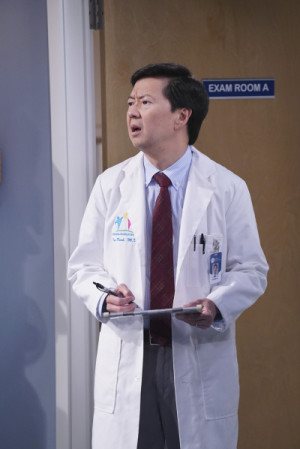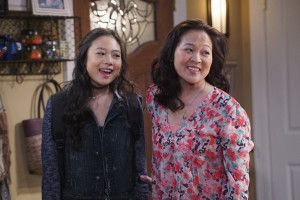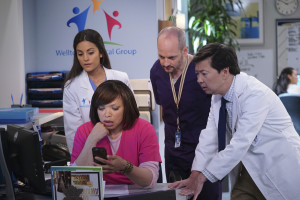Dr. Ken, Season 1, Episode 1: “Pilot”
Original airdate October 2, 2015.
 Symptoms: Dr. Ken Park deals with his daughter Molly’s earning her driver’s license, seeking advice from people in the office about keeping an eye on her versus trusting her. He chooses to track her, against the wishes of his wife, Dr. Allison Park. Meanwhile, his young son rehearses for an upcoming talent show, preparing a mimed interpretation of Katy Perry’s “Roar,” much to Dr. Ken’s chagrin.
Symptoms: Dr. Ken Park deals with his daughter Molly’s earning her driver’s license, seeking advice from people in the office about keeping an eye on her versus trusting her. He chooses to track her, against the wishes of his wife, Dr. Allison Park. Meanwhile, his young son rehearses for an upcoming talent show, preparing a mimed interpretation of Katy Perry’s “Roar,” much to Dr. Ken’s chagrin.
Diagnosis: Lots of real laughs, but too willing to settle for stupid. Dr. Ken has a strong cast whose newness is painfully evident. Timing in the office scenes (anchored by Tisha Campbell-Martin, a huge asset) is rough, and family scenes are only slightly better. To their credit, Ken Jeong and Suzy Nakamura seem the most familiar with each other, bringing a Cliff-and-Clair-Huxtable kind of dynamic. I love that their characters make each other smile, and although they’re still finding their chemistry, you can see how these two smart people might have been drawn together.
There are some genuine laughs here, ‘though the writers are too willing to let smart-stupid become stupid-stupid. Ken acknowledging he’s unhappy about his daughter’s getting her driver’s license and claiming to need both family cars because he’s having a parade is smart-stupid with Jeong’s great delivery; tying a necktie around his head and ripping his sleeves off in order to get into a club is stupid-stupid. And there’s a place for a good butthole joke, but if you’re not going to do something interesting with it, it’s just a butthole joke, the kind of lowest-common-denominator stuff that wastes the talents of Jeong and Stephen Tobolowsky, one of the best character actors in the world.
Insult humor can easily teeter into meanness, and meanness is never funny. It says a lot about Jeong’s acting chops that he communicates genuine fondness for his family and friends even while insulting them. It’s made clear by the other characters that they accept the funny in the intended, loving spirit. This is not the case with the doctor’s interaction with his patient, and although this is offered for the payoff at the end, there’s got to be a better way to pull that off.
For this first episode, it’s not the most important thing for Dr. Ken’s family to feel authentically Asian American, but it’s way up there on the list, because let’s not kid ourselves: there’s something going on here that’s not just about a new sitcom and whether it’s funny or not. The Park family (thank the writers) doesn’t go out of its way to remind its audience of its Asian Americanness, but there is a deliberate effort to give it authentic Asian American character, as when Ken quotes his father in the Korean language. Props to everyone for the right balance between just-like-your-family and not-exactly-like-your-family.
 Prognosis: Because I love Ken Jeong as a comic actor, and because I love Tisha Campbell-Martin (It’s only because of her that I continued to watch Martin even when it stopped being funny), and because my hapa heart wants to see better Asian representation in mainstream media, I really, really, really want Dr. Ken to succeed. I have lived in America my whole life, and on a day-to-day basis, I see far more real-life families like the Huangs on Fresh off the Boat and the Parks on Dr. Ken than I do other typical sitcom families. The America (and Americans) I know have been so rare to see on television that it’s easy for me to feel kind of ripped off. Unlike many of my fellow writers of Asian ancestry, I do not believe it is the media’s responsibility, especially in what is ostensibly the artistic realm of visual media, to represent me or my family or my entire state the way I am used to seeing them, but if truly talented actors like Randall Park, Constance Wu, and Ken Jeong can be on great sitcoms, I’m grateful to see it. This is why I want to love Dr. Ken, but I don’t want it to get a pass just because of it. If it succeeds, I want it to succeed because it’s excellent, because given the kind of input Ken Jeong has on this thing, and because of the talent across the board, there’s no reason it can’t be. If it fails, I want it to be for reasons quite the opposite. This is why I will evaluate episodes based on their merits as television entertainment the way I appreciate television entertainment, and not on their cultural importance, no matter what my heart wishes.
Prognosis: Because I love Ken Jeong as a comic actor, and because I love Tisha Campbell-Martin (It’s only because of her that I continued to watch Martin even when it stopped being funny), and because my hapa heart wants to see better Asian representation in mainstream media, I really, really, really want Dr. Ken to succeed. I have lived in America my whole life, and on a day-to-day basis, I see far more real-life families like the Huangs on Fresh off the Boat and the Parks on Dr. Ken than I do other typical sitcom families. The America (and Americans) I know have been so rare to see on television that it’s easy for me to feel kind of ripped off. Unlike many of my fellow writers of Asian ancestry, I do not believe it is the media’s responsibility, especially in what is ostensibly the artistic realm of visual media, to represent me or my family or my entire state the way I am used to seeing them, but if truly talented actors like Randall Park, Constance Wu, and Ken Jeong can be on great sitcoms, I’m grateful to see it. This is why I want to love Dr. Ken, but I don’t want it to get a pass just because of it. If it succeeds, I want it to succeed because it’s excellent, because given the kind of input Ken Jeong has on this thing, and because of the talent across the board, there’s no reason it can’t be. If it fails, I want it to be for reasons quite the opposite. This is why I will evaluate episodes based on their merits as television entertainment the way I appreciate television entertainment, and not on their cultural importance, no matter what my heart wishes.
 The prognosis for Dr. Ken, based on its pilot episode, is optimistic but not solid. It has a few things conspiring to work against it, such as the burden of representing a whole ethnicity a certain way. But it has a very good cast, a star with true comedic range, and a heart firmly planted in the right space. If it can avoid putting its head up its butt (to paraphrase the worst line in this episode) and let that heart steer the ship, it can be a bright spot in the primetime sky.
The prognosis for Dr. Ken, based on its pilot episode, is optimistic but not solid. It has a few things conspiring to work against it, such as the burden of representing a whole ethnicity a certain way. But it has a very good cast, a star with true comedic range, and a heart firmly planted in the right space. If it can avoid putting its head up its butt (to paraphrase the worst line in this episode) and let that heart steer the ship, it can be a bright spot in the primetime sky.
Rx: The show is filmed in front of a live audience, so my disdain for laugh tracks is assuaged some, as long as studio audiences don’t get stupid (I’m looking right at you, studio audiences of The Big Bang Theory!). Whether they do or not, I would beg the technicians on Dr. Ken to mix the laughter down a bit. Your TV audience is smart; it doesn’t need prompts for when to laugh. I further prescribe an avoidance of potty humor, not because it’s not funny, but because it’s too easy. Set your bar higher, and your audience will follow. I hope. And I understand the importance of developing Dr. Ken’s office characters, but take your time. Don’t feel you need to give lines to everyone in each episode; let your audience get to know them gradually, establishing the stronger relationships before expanding the circle, because what will make the show special isn’t the laughter or the poignant endings, but the specialness of the relationships, which an actor like Ken Jeong is capable of defining, if he’s given time to do it believably.
Take regularly every day and see me again next Friday night.








